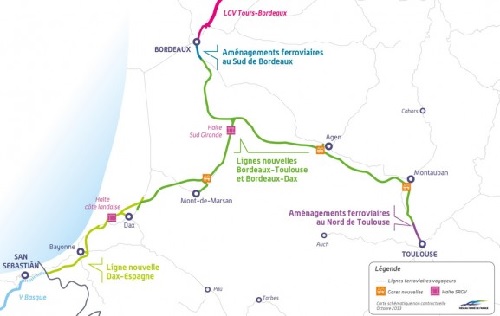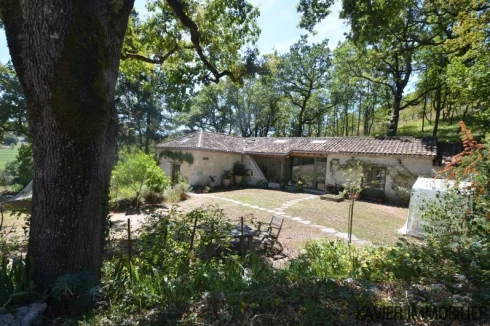Public Enquiry Rejects South West TGV Lines
Tuesday 05 May 2015
A major public inquiry into two proposed high-speed train lines in the South West of France has come out against the plans.
In a report that chimes with the mood of austerity in France, a public enquiry into two proposed high-speed TGV lines between Bordeaux-Toulouse and Bordeaux-Dax has come out unequivocally against the lines.
The report states that the economic benefits of the lines are not clear, their profitability is highly questionable, the funding is uncertain, and there are significant environmental and social objections.
Significantly, it follows hot on the heels of a highly critical report of the TGV network submitted to the government last October by the French National Audit Office, the Cour de Comptes.
A major question mark now hangs over this flagship infrastructure project, one of the largest in South West France.
The two lines form the first phase of what is known as the Grand projet ferroviaire Sud-Ouest (GPSO), with the aim of providing a high-speed rail link between Paris and Bordeaux/Toulouse and, in the second phase, a high speed from Dax into Spain.
The cost of the works for the Bordeaux-Toulouse line is estimated at around €6m, whilst the Bordeaux-Dax line a further €3.2m. The Bordeaux-Toulouse line is scheduled to be completed by 2024 and Bordeaux-Dax in 2027.
Although the project has the support of most national and regional political chiefs, it is one that remains hugely controversial, and this point was jumped upon by the public enquiry as one reason for giving an unfavourable opinion.
In their report they state that nowhere is there majority support for the project: "Aucune catégorie, même les entreprises, n’est majoritairement favorable au projet...... Au final, la commission n’a pas décelé l’expression d’un véritable besoin de lignes à grande vitesse dans le Sud-ouest."
But the public enquiry also had other major reservations, notably concerning the cost and the level of the service, which it considers will need an on-going public subsidy. "Une infrastructure lourde pour un service non garanti. Si le coût du projet....est connu, le service rendu aux usagers sur ces lignes ne peut être garanti par la SNCF selon des critères de rentabilité qui lui sont propres... Le service ... va conduire à des dépenses lourdes de fonctionnement et d’investissement pour la région Aquitaine."
As far as wider economic benefits are concerned, the report expresses concern about the 'metropolitisation' of the project, to the detriment of rural areas. It considers that economic development would concentrate around Bordeaux and Toulouse, draining the intermediate areas of economic activity.
It 'deplores' that alternatives to a high-speed line, such as upgrading the existing line, were not sufficiently examined. More broadly, it is concerned about the future of the existing inter-city lines should the high-speed lines be developed, as it considers resources may not be sufficient to ensure a proper service for both of them.
The enquiry argued that although the lines would reduce travel times, this was not necessarily a priority of users, who were in general more concerned about the comfort and quality of the regular services than a faster service for which they would pay more.
Finally, the report expresses considerable doubt about funding for the project, with a number of local councils already failing to meet their obligations on the early stages, and reduced central government grants to the councils making it very difficult for some to be able to meet their obligations.
The enquiry report has now been passed to the government for consideration, who have until June 2016 to give their reply. They are not bound by the conclusions of the enquiry, which is consultative only.
They will face strong pressure from regional politicians whose leaders have come out in unison to publically to criticise the report, arguing that the lines are essential for the economic development of the region.
There is also a wider national and European dimension that is likely to weigh heavily on the government in their consideration of the project.
Earlier this year, despite widespread criticism and huge uncertainty about funding, the government signed off the new high-speed line between Poitiers and Limoges.

Next Article: Sterling/Euro Review
Thank you for showing an interest in our News section.
Our News section is no longer being published although our catalogue of articles remains in place.
If you found our News useful, please have a look at France Insider, our subscription based News service with in-depth analysis, or our authoritative Guides to France.
If you require advice and assistance with the purchase of French property and moving to France, then take a look at the France Insider Property Clinic.





